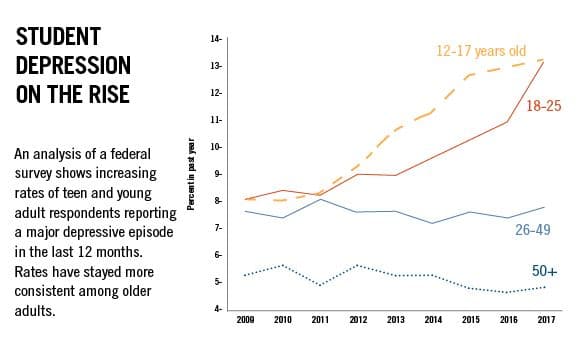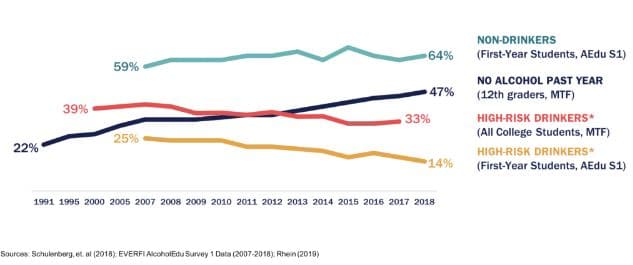George Dawson, a student of Humanities and victim of acute mental disorder confessed,
“It’s sick to realise that it had been a persistent problem in me that I could not concentrate on my daily assignments, prepare for exams or reach class on time. Even though I consulted Allessaywriter for assisting me with my academic paper, it’s high time I should consult a physician to help me cope with mental stress. It’s a demon that is gradually getting the better of me.”
The picture depicting a crisis calls for immediate action in the form of remedial measures to stop mental disorders from plaguing university students.
As a matter of fact, the report titled “Under the Radar: The Mental Health of Australian University Students”, suggests a lack of government policy, attention and resources directed towards the alarming issue of threatened mental health of the university students.
In other news, one in three college freshmen across the globe reports mental health disorder. It is said, while anxiety and depression are the most commonly reported mental illness, substance abuse, eating disorders, are self-injury are close behind.
Let’s dig deeper, and figure out the factors behind this globally alarming concern, along with remedies that can put an end to this dire strait.
Social change and disintegration
According to a report, university newcomers going through a rapid social change during the initial years might bring an impact on their mental health, thus leading to certain disorders.
This could be, at times, out of insecurities concerning the socio-economic conditions of the student’s family that might restrict him/her from achieving their own sense of self-worth and presence among friends, thus, leading to peer-pressure.
For instance, a student from a middle class or a lower middle-class family might find financially challenging to hang out with a crowd that prefers cafeterias, multiplexes and lounges over casual or less expensive hang-out places.
This, as a result, might make the student feel left out or inferior, thus, creating mental pressure, as the poor chap might fail to fit in to the crowd, despite all odds.
Depression
Depression is said to be one of the common problems faced by International students in the U.S.A. and most of the other major countries. It may come in various shapes and forms.
According to a survey conducted by the Association of University and College Counselling Centre Directors, 36.4% of reported that they experienced some level of acute and juvenile depression on various occasions.
The American Psychological Association (APA) is of the opinion that depression is the most common mental disorders among university students. It could eventually lead to other disorders or suicide, if left untreated.
The Journal of Abnormal Psychology depicts how depression and substance abuse have got the better of university students over a period of more than a decade (2005 – 2017).

Source: APAorg & Education Week
According to APA, the symptoms of depression include;
- Emotional symptoms: These are often associated with hopelessness, feeling overwhelmed, and feeling of melancholy for no specific reasons, mood swings and the likes.
- Over-thinking symptoms: At times, university students may have a problem paying attention to their daily lessons, taking class notes and the likes, as their mind tends to remain occupied with other thoughts.
For example, it is quite common among the college/university students to get affected due to relationship issues, anxiety disorders developed on the ground of scoring top grades, coping up with an overly complicated and lengthy syllabus and the likes.
- Symptoms associated with physical well-being: Changes in academic norms and syllabus leads to changes in sleep and food habits, lack of sleep, loss of appetite and the likes.
If an overly complex and tricky dissertation keeps you awake the entire night, then it would only lead to discontentment, psychological dissatisfaction and other issues pertaining to depression.
Substance Abuse
Alcohol and drug abuse have become a common conflicting factor among university students developing mental stress and anxiety. Even though some students might start drinking and smoking on occasions, there are reports displaying students developing as an addiction.
According to the National Institute of Alcohol Abuse and Alcoholism (NIAAA), 25% of students who regularly drink are prone to facing more academic troubles. Most alarmingly, almost 33% of college/university students meet the High Risk Drinkers criteria.

Source: Monitoringthefuture
As a result, this might lead to:
- Fear, anxiety and paranoia
- Financial crisis due to a sudden need for money
- Deterioration of physical appearance such as weight loss/gain, drastic change in personal grooming habits and behaviour
Now that you know about the alarming health problems and mental disorders each of the aforementioned factors create for the university students, pull up your socks and read through the below mentioned key remedial measures.
Rescuing University Students from the Clutches of Mental Disorders
According to CNBC.com, 21% of respondents of a survey experience lifelong mental disorder symptoms, followed by general anxiety disorder affecting 18.6% of students.
Even though schools, colleges and universities across the globe have made significant investments in mental health resources, the researchers are of the opinion that they have found that colleges and universities are still ill-equipped to cope with the surge of mental health care necessities.
Now that the topic has turned out to be a critical one over the years, let’s take a look at some of the effective home remedies and self-care options that can gift a better tomorrow to the university students struggling with mental stress and disorders.
If you find your university mate trying hard to untangle the knot of depression, ask him/her the following questions and analyse the response accordingly.
- Does the victim’s family have a history of depression?
- Did he/she experience invasive thoughts of suicide or death?
- Is he/she uncomfortable or extremely anxious in certain social environment?
- Is the victim plagued with certain guilt or paranoia?
Once you are done analysing the answers to each of the questions mentioned above, it would be easier for you to recognise the root cause and consult physicians for other essential diagnosis and treatment.
Learn how to notice the signs of depression in you or among other students. Lookup for these signs of depression in the prospective victim.
- The person is no longer enjoying social activities he/she once loved.
- Expressing negative reactions to most of the talks, events and other activities.
- Experiencing extreme anger or sadness over university curriculum, relationship, clash of opinions and the likes.
If you are successful in analysing each of the mentioned symptoms of depression in you or your friend:
- Look for a change, engage in mindful activities such as yoga,
- Involve in creative projects such as blog writing, painting, sketching and the likes.
- Embrace the practice of waking up early and daily exercise to keep negativities, leading to fatigue and depression at bay.
Rehabilitating University Students Struggling with Mental Disorders
It goes without saying, merely recognising the mental disorder symptoms and suggesting home remedies might not be good enough for a student who needs further care.
Acknowledging this concern, I would like to share some of the best holistic institutes and rehabilitation centres across the globe, curing hundreds of young victims over the years.
- The Holistic Sanctuary, California
Specialisation: Burnout and Stress, Depression, Trauma Treatment
Price: $50,000 per month
- Camino Recovery, Spain
Specialisation: Substance Abuse, Trauma Treatment, Depression, Anxiety
Price: €22,500 per month
- The Place Retreats, Indonesia
Specialisation: Depression, Anxiety, Stress and Burnout
Price: €700 per day
- Skyland Trail, Georgia, United States
Specialisation: Various levels of psychiatric care services
Price: $33,000 per month
- Goodsky Mental Health Retreat
Specialization: Symptoms of depression and anxiety, treatment on the root cause of all psychological disorders, long-term stress, unresolved trauma, sleeping disorders and more.
Price: $40,000 AUD+ for 6 weeks
Parting Words
Addressing the concern related to mental disorders among university students, and the remedial measures that can be embraced in order to improve the situation, let’s hope for a better tomorrow.
Strong willpower and determination to fight out all odds are the two most powerful elements that would keep the victim going.
Remember,
“There is hope, even when your brain tells you there isn’t.” – John Green American Author
Cheers!
Author Bio:
Selina Jonson is a digital web designer and developer for ‘do my homework’ site MyAssignmenthelp.com. She is an active blogger and a voracious reader. In her free time, she loves to travel and explore places.













